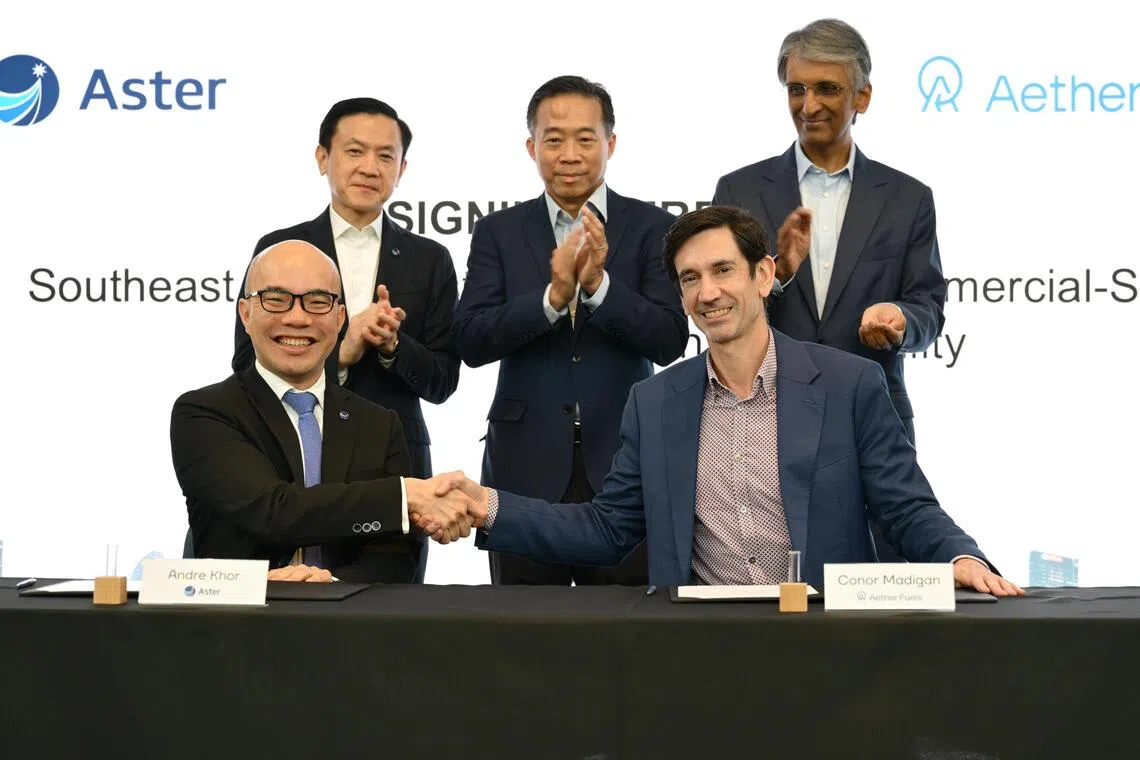SINGAPORE – A new facility on Pulau Bukom will produce sustainable aviation fuel from 2028, with Singapore Airlines (SIA) and US low-cost carrier JetBlue potentially becoming its early users.
The Project Beacon facility will be developed by climate technology start-up Aether Fuels and Aster, and produce up to 50 barrels a day – or 2,000 tonnes of fuel annually – when completed in 2028.
It will be located at Aster’s refining hub on Pulau Bukom, which the chemical, energy and infrastructure solutions company took over from Shell in April.
Aster and Aether Fuels, which inked their partnership on Nov 11, did not disclose their investment amount.
Before this, Aether Fuels – which has counted Temasek-owned Xora Innovation as its lead investor since 2022 – had a pilot plant in the United States.
The technology that Aether Fuels uses to produce the green aviation fuel yields 20 per cent more fuel while requiring only half as much investment in equipment compared with producing sustainable fuel using waste oils, according to Mr Conor Madigan, the company’s founder and chief executive.
The technology is also flexible as it can use various other raw materials.
Construction will begin in the second half of 2026, and the facility will employ a staff of 24 once operational.
A second, larger plant is also being planned in parallel with the initial facility. It can produce 1,000 barrels of the fuel per day, said Mr Madigan.
This translates to an annual production of 330,000 tonnes.
Sustainable aviation fuel is jet fuel made from renewable or waste-based sources that produce lower greenhouse gas emissions than conventional fossil jet fuel.
Finnish energy giant Neste
operates a refinery in Tuas South
that can produce up to one million tonnes of such fuel from waste materials like used cooking oil and animal fats annually.
Aether Fuels’ technology uses industrial waste gases and biomethane to produce the fuel, which achieves a more than 70 per cent reduction in greenhouse gas emissions compared with conventional jet fuel, according to the company. This approach is not as readily available as the technology used by Neste.
Sustainable aviation fuel is widely regarded as the most practical way to decarbonise the aviation industry, which contributes 2.5 per cent of global carbon emissions, as it does not require aircraft modification or new airport infrastructure. The fuel is blended with fossil fuel-based jet fuel before use.
The greener fuel is almost four times more expensive than fossil fuel-based jet fuel.
Mr Madigan said that in August, sustainable aviation fuel cost between US$2,700 (S$3,520) and US$2,800 per tonne, compared with between US$700 and US$800 per tonne for conventional jet fuel.
He said Aether Fuels aims to narrow this price gap, although costs will still depend on factors beyond its control, such as the price of hydrogen and renewable energy, which is needed for production.
Singapore aims for sustainable aviation fuel to form 1 per cent of all jet fuel used at the Changi and Seletar airports in 2026. On Nov 10, the Civil Aviation Authority of Singapore announced that from October 2026, passengers and cargo on departing flights from Singapore
will be subjected to a levy to fund
purchases of sustainable aviation fuel to meet this target.
In February 2025, SIA Group signed a memorandum of understanding with Aether Fuels to potentially buy the fuel for five years when it begins commercial production. The sustainable aviation fuel will be blended with regular jet fuel before being supplied to selected airports served by SIA and its subsidiary, Scoot.
In September 2024, JetBlue signed a non-binding agreement with Aether Fuels to potentially buy fuel when commercial production begins.

(Front row, from left) Aster deputy chief executive Andre Khor and Aether Fuels founder and chief executive Conor Madigan inking the partnership. Witnessing the signing ceremony are (back row, from left) Aster group CEO Erwin Ciputra, Economic Development Board chairman Png Cheong Boon and Temasek Holdings CEO Dilhan Pillay.
ST PHOTO: NG SOR LUAN
Speaking at Aster and Aether Fuels’ signing ceremony, Economic Development Board chairman Png Cheong Boon said the partnership reflects the ongoing transformation taking place in Singapore’s energy and chemicals sector.
He said the energy and chemicals sector accounts for about a quarter of Singapore’s manufacturing output and contributes 3 per cent to the country’s gross domestic product, making it one of the largest manufacturing sectors.
Singapore wants the industry to go green in step with global trends, and the Aster-Aether Fuels partnership aligns with the country’s vision for the industry and “helps steer the industry towards that goal”, he added.

